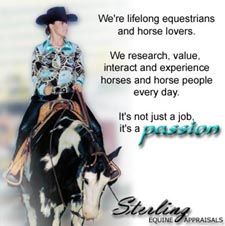There are appraisers who will tell you they can appraise any kind of horse. Really? It's not just simple math. Appraising is more than just mathematical formulas, where an appraiser "pluses" or "minuses" to arrive at a reliable valuation. In my opinion, appraisers who say they can appraise any horse, even ones they don't have personal experience with, are missing a few key elements.
Ethics
The American Society of Equine Appraisers has a published Code of Ethics. The first principle is straight forward:
The appraiser shall achieve and maintain a high level of competence, shall keep himself or herself informed as to all matters involving or affecting livestock and equine values, and shall accept only those assignments for which he/she has the necessary background and qualifications.
Standards
Without a clear understanding of breed standards, it is impossible to accurately evaluate the subject equine. Conformation, movement, and even manners can be defined in a particular breed's standards. They vary from breed to breed. Some breeds even have multiple registries with differing ideals. And, competitive associations have their own rules, standards, and awards. An acceptable and legal practice in the presentation of one breed of horse may be frowned upon or illegal in another.
Contacts
Unlike real estate and some commodities, there isn't a central market for horse sales. As such, there is no single repository for historical horse prices by breed, sex, and discipline. Each appraisal is researched on its own merits. The starting point is a strong network of contacts throughout various segments of the equestrian community. Sales barns and auctions provide guidance around the whole market, but it is private treaty sales - sales between individual buyers and sellers - that make up the bulk of sales comparisons for most breeds. Appraisers must continuously groom their network of owners, agents, and others to keep an accurate pulse on the rhythms of each breed, discipline, and level within each market.
The attorneys we work with know they can count on us to be experts in certain areas. And, we're quick to refer them to experts in other areas when necessary. For example, I do not have the background or network to appraise a Mule, a Gypsy Vanner, or a working Carriage Horse - though I have recently offered referrals for all of these.
We're lucky to have a well rounded team at Sterling Equine Appraisals. We have team members who focus on specific breeds and specific disciplines. They participate and interact in that segment of the horse industry every day, keeping their eyes well trained and their skills up to date with current market trends. This pool of resources allows us to appraise a wide variety of horses...but I'd never say we "know it all!"


